On Saturday I took part in an All Things Trek show on Trek Radio where we talked Star Trek and feminism. We touched on a bunch of episodes, including “The High Ground”: one of the very few Trek episodes both directed by and written by a woman (Gabrielle Beaumont and Melinda M. Snodgrass respectively).
Let’s start with a super-quick recap of the plot:
The Enterprise is called to Rutia IV (a planet populated by people who look totally human but all have skunk stripes in their hair to help distinguish them) to deliver medical supplies after an outbreak of violent separatist protest. While there, Crusher gets abducted by the Ansata terrorists, who are dying due to the use of an advanced transporter-type technology. Riker works with the female head of Rutian security, Alexana Davos, to try to find Crusher through often repressive methods. Crusher tries to convince the terrorist leader, Kyril Finn, to stop the killing. Basically, everyone’s ethics and principles are challenged.
There’s a lot to really appreciate about “The High Ground”:
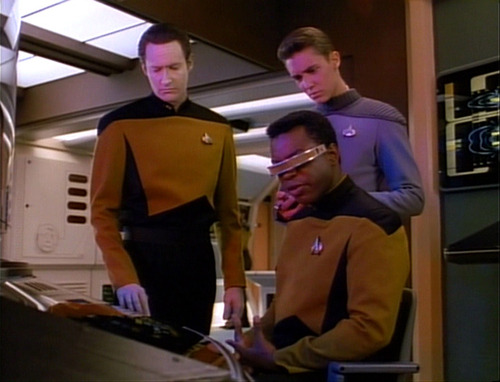
1. Like Snodgrass’ “The Measure of a Man”, no character is wasted.
Everyone has something to do or a key perspective to represent in this episode. There’s the main crew members being involved in figuring out the Ansata rebels’ transporter technology and investigating on the planet (Geordi taking the bomb off the warp core with what appears to be a sonic screwdriver is probably my fave), but also really well-rounded guest characters.
Kyrill Finn is the face of the Ansata. He brags about killing for his cause but there are moments when we can’t help but empathize, such as when he mentions his son’s death. And his talent for drawing shows he’s much more than a heartless killer.
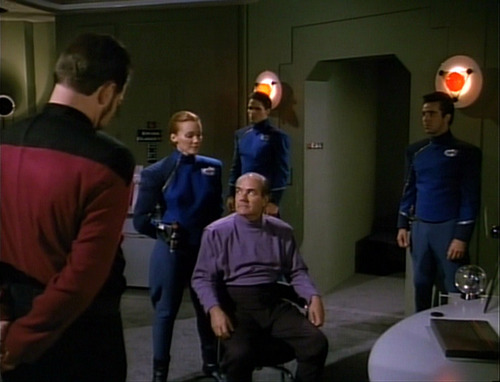
Alexana Davos is the flip-side of the coin: a ruthless security chief but one who makes it clear she believes repressive tactics are the only way to stop the death of innocents. Both Davos and Finn commit violence, but each believe they are reacting to the other and that they are entirely justified.
Riker: You hate them as much as they hate you.
Davos: Believe it or not, I always considered myself moderate.
Riker: What changed your mind?
Davos: Being stationed here for six months, watching the body count grow. The three assassination attempts on my life.
Riker: Well, that’ll change your point of view.
Davos: The event that really opened my eyes took place only a few days after my arrival. A terrorist bomb destroyed a shuttlebus. Sixty schoolchildren. There were no survivors. The Ansata claimed that it was a mistake, that their intended target was a police transport. As if that made everything all right. That day I vowed that I would put an end to terrorism in this city. And I will.

2. The Issues are Messy
So the two main characters both claim to be moral, and neither one is clearly right (yes, the Ansata are violent terrorists, but are the repressive tactics adopted by the Rutians, such as arresting children, justified?).
The moral ambiguity is also expressed more directly by a conversation between Data and Picard:
Data: I have been reviewing the history of armed rebellion and it appears that terrorism is an effective way to promote political change.
Picard: Yes, it can be, but I have never subscribed to the theory that political power flows from the barrel of a gun.
Data: Yet there are numerous examples where it was successful. The independence of the Mexican State from Spain, the Irish Unification of 2024, and the Kensey Rebellion.
Picard: Yes, I am aware of them.
Data: Then would it be accurate to say that terrorism is acceptable when all options for peaceful settlement have been foreclosed?
Picard: Data, these are questions that mankind has been struggling with throughout history. Your confusion is only human.
I like that the episode leaves this issue unresolved, even though it’s a bit depressing.

3. Doctor Crusher: Action Hero
This is a great episode for how Crusher is portrayed. Even though she’s abducted, she’s never the damsel in distress. She’s always competent and as assertive as she can be, under the circumstances.
My favourite part is when she calls Finn out on how he’s treated her, showing she’s not just going to fall for him or his cause:
Finn: I’ve treated you with respect.
Crusher: You’ve scared the hell out of me, Finn. You’ve controlled me through fear just like you’ve tried to control this whole continent.
Finn: You haven’t tasted real fear yet, Doctor.
Crusher: Is that the best you can do? Is fear the only weapon you have?
When people talk about TNG the critique is often raised that the only two main women characters (Crusher and Troi, after Yar’s death) were in “nurturing professions”. While I think that’s a fair point that women should be represented in non-traditional as well as more traditionally feminine roles, we have to unpack it further. What does it mean that we talk about Crusher as being in a nurturing profession but not Bashir or Phlox? Are we saying a woman doing it makes it more nurturing somehow?
At any rate, in “The High Ground”, Crusher’s role as a doctor is indispensable, and her skill highlighted by Finn, who says he knew she had to be good to be the doctor on the Federation flagship. And she still gets to be emotional and maternal without that compromising her strength or competence.
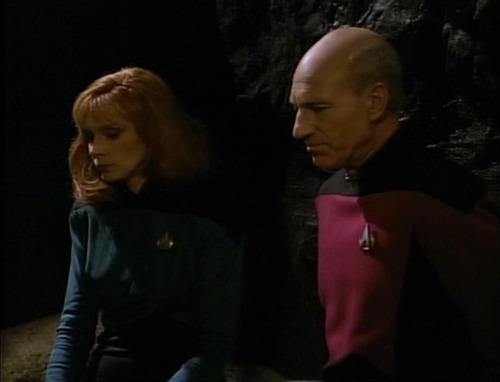
The only thing I would change if I got to re-write this episode is the ending. Once Picard is abducted, what was an awesome story about Beverly becomes as much about Picard – whether or not he can be convinced to help and whether or not Finn will kill him. Crusher becomes less central, more passive.
When the Enterprise crew bust in to rescue the hostages, Finn goes to shoot Picard but is shot by Davos, who’s almost shot by a little boy. Crusher at least gets the last word in the standoff, convincing the boy to drop his weapon by firmly stating: “No more killing.”
It would’ve been nice to see Crusher carry the story the whole way, maybe ending with her contemplating the moral issues or getting Riker’s line about the boy putting his gun down being a sign of the potential for peace.
Bechdel-Wallace Test: Fail








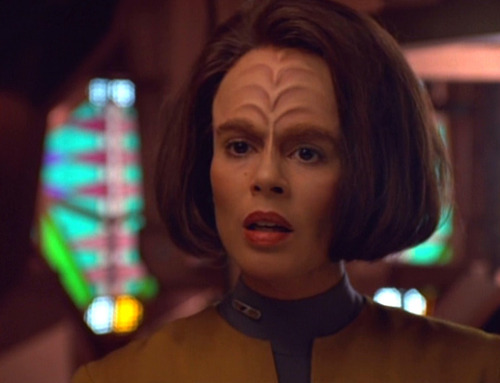
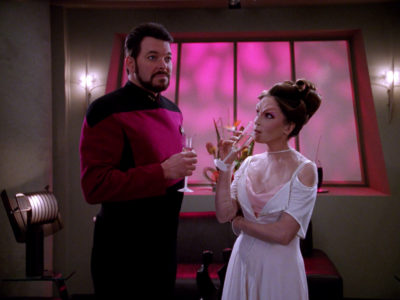
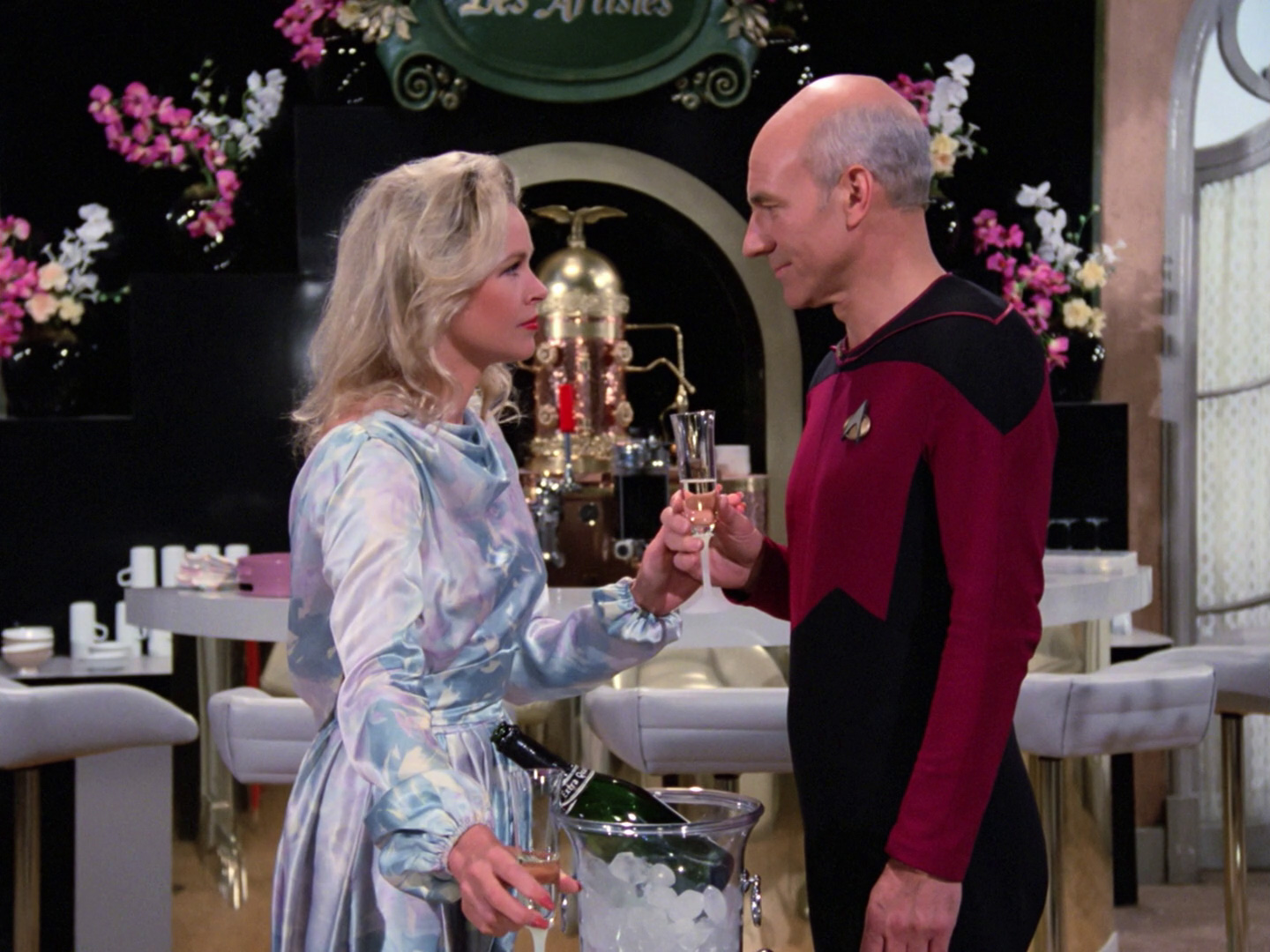
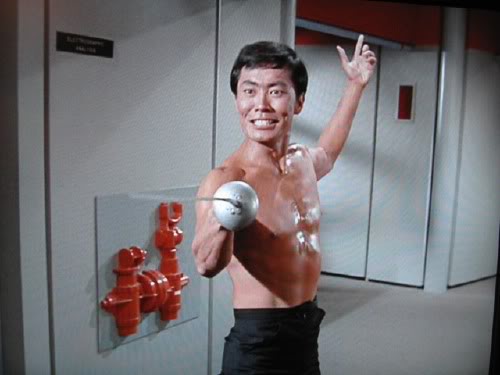
2 Comments
Add Yours →I will say that as a female doctor, Crusher was given less to do than McCoy or Bashir overall. DeForest Kelley obviously had star billing, which explained why he was inexplicably hanging around Kirk and Spock rather than staying in Sickbay. Dr. Crusher’s character was often left with little to do, and in many episodes, she was only in one scene. Cut to DS9, and I noticed that in several instances, Dr. Bashir was in Ops or on the bridge of the Defiant for no other reason than to spout random lines of superfluous dialogue. If anything, Dr. Crusher should have gotten more pointless bridge scenes than Bashir, because she was actually a command-level officer and was a Starfleet veteran, rather than someone fresh out of the Academy. It just goes to show that male characters are written with more consideration than female characters.
I’m always confused by the fans who hate Crusher in (and because of) this episode. They seem to believe she endangered the entire Enterprise because she was selfish and the supported and flirted with a terrorist. What am I missing?